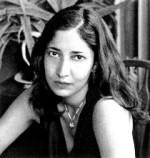The 2006 Man Booker Prize: Kiran Desai
Salma Ridhak
According to newspaper accounts Kiran Desai's mother Anita Desai (herself short-listed thrice for the Booker) was in Dehra Dun when she was shaken awake at 5:00 in the morning. "You'd better see this," her sister-in-law yelled excitedly. On the television screen Anita Desai saw her daughter in London accept the 2006 Booker prize for her novel The Inheritance of Loss. Kiran said : "To my mother, I owe a debt so profound and so great that this book feels as much hers as it does mine. It was written...in her wisdom and kindness, in cold winters in her house when I was in pieces. I really owe her this book so enormously."It was a sentiment that found immense favor with my father, who considers Anita Desai's In Custody as one of the best English-language novels to come out of India. Made into a movie (available at my local Blockbuster video store), its subject was the decline of Urdu in post-independence India, a language that became hostage to linguistic politics, ethnicity and religion. In Custody was short-listed for the Booker in 1984, but as my father insistently declares, "They gave it to the wrong Anita," meaning Anita Brookner, whose entry Hotel du Lac waltzed away with the prize. But then my father's what sportscasters here call a die-hard fan. It seems apt that Anita Desai was at Dehra Dun when news came of Kiran and the Booker prize. For though The Inheritance of Loss begins, and ends, in Kalimpong in Bengal, on the slopes of the northeastern Himalayas, to anyone who has been to those parts of India, as I have, the book's atmosphere and dominant mood is of the country's old hill stations, of Mussorie (the haunts of the writer Ruskin Bond), of the old Naini Tal, but now gone to seed, ruined beyond recognition. There is the retired judge embittered and isolated by his Anglicization, his orphaned granddaughter Sai, Sai's tutor and lover Gyan (who leaves her for the Gurkha Liberation Front), two eccentric sisters, the judge's cook, and the cook's son Biju, who has fled from Kalimpong to Manhattan in search of a better life. It is a world long past the Merchant-Ivory confections, where the old certainties are fled, a world where the cruelties of colonialism have been replaced by the cruelties of globalization. It is a world she writes about with a coolly unsentimental eye, and which no doubt led the Times Literary Supplement reviewer to say that the book's vision is "morose." The novel's sympathies are with the poor, for the vast underclass on whose backs rests the world's thin crust of neon glamour: the judge's cook is the latest in a long line of "porters (who) had carried boulders from the riverbedlegs growing bandy, ribs curving into caves, backs into U's, faces being bent slowly to look always at the ground." His son Biju leads the haunted existence of the illegal immigrant in America, a life in the lower depths of fancy restaurant kitchens which were "perfectly first-world on top, perfectly third-world twenty-two steps below." The judge has been twisted by his encounter with white England, while the death of Sai's parents symbolizes the pitiable end of Indo-Soviet friendship. Kiran moves easily from New York to Gujarat, from Nepali nightwatchmen to the "Indian women of the English-speaking upper educated" with their "self-righteousness," from snake worship to the ice-bound Hudson river. Her choice of Kalimpong for the book's opening scene is a brilliant one, since it enables her to exhibit her marvelous, highly individual style: "All day, the colors had been those of dusk, mist moving like a water creature across the great flanks of mountains possessed of ocean shadows and depths. Briefly visible above the vapor, Kanchenjunga was a far peak whittled out of ice, gathering the last of the light, a plume of snow blown high by the storms at its summit." The standard never falls throughout a 324-page book. The same linguistic felicity had been exhibited by her in her first book, Hullaballoo in the Guava Orchard, but that had been a wry, satiric effort in the magical realism mode. In the eight years since then she has come of age. Kiran Desai is 35 years old, the youngest woman to win the Booker. One feels safe in predicting that a few more surprises seem to be in store for us. And for my father, who said after finishing the book: "Almost as good as her mother." Salma Ridhak works for an alternative newspaper in the Bay Area, United States.
|

|